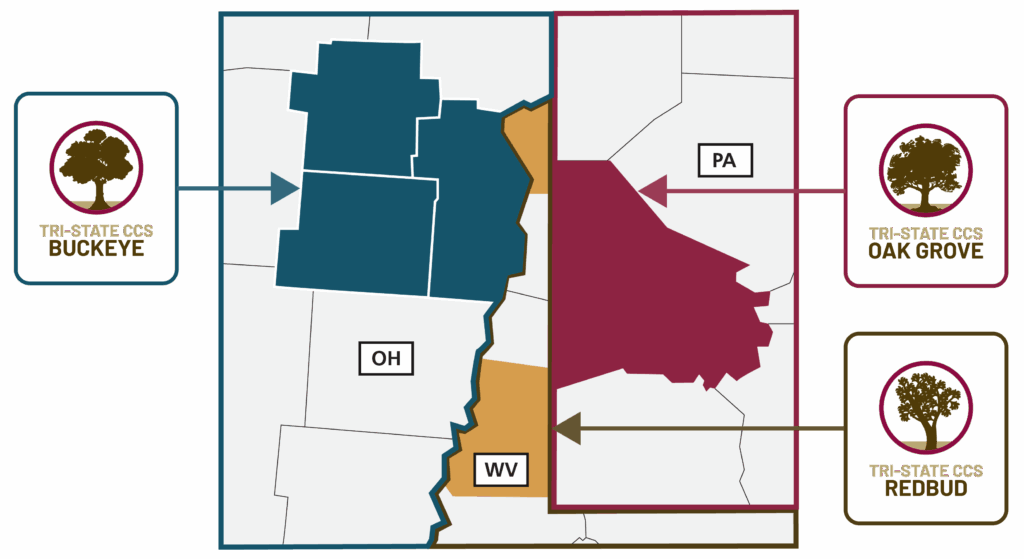Tenaska is developing a carbon capture and storage (CCS) project that would serve emissions customers in Ohio, West Virginia and Pennsylvania. As proposed, carbon dioxide (CO2) emissions from these facilities would be captured and transported to geologically secure underground storage locations in the Tri-State area.
Our Tri-State CCS Redbud segment focuses on West Virginia. We are considering Hancock and Marshall counties for the underground storage component.
Tenaska representatives are reaching out to landowners in these areas about acquiring pore space on their property. Pore space rights are similar to mineral rights, but we would acquire the rights to store CO2 rather than remove it.
We recognize the importance of oil and gas production in this area, and we don’t intend to interfere with landowners’ ability to monetize their mineral rights. A CCS storage field can coexist with oil and gas production.

Landowner Benefits
We know your land is your livelihood, whether you use it for farming, ranching, recreation, leasing or other purposes. Tenaska aims to be a good steward of this land, support its long-term preservation and provide an added source of income for your family over the next 30+ years.

Create another income stream. A carbon capture and storage (CCS) project allows landowners to create value from an unused part of the land’s geology deep beneath the surface. Your family can receive payments from the pore space rights for decades.

Continue utilizing the majority of your land. Other than a few carefully sited wells above ground, the storage area is safely located deep underground. You can continue using the land’s surface for other purposes.

Rest assured that this is a profit-positive opportunity. Costs associated with the development, construction and operation of the storage field are paid for by Tenaska.
Overall Economic Benefits:
An economic impact study from West Virginia University estimates the impact of Tri-State CCS during the construction and operations phases of the project. Here’s a glimpse of what’s in store:
Construction Phase
- Estimated Economic Impact: $1.1 Billion
- Job Creation: 1,900 Jobs, with $412 Million in Salaries
Ongoing Operations
- Annual Spending: $22.4 Million
- Job Creation: 53 Jobs, with $4.6 Million in Salaries
- Tax Revenue: $1.8 Million Annually to State and Local Government
State-Specific Economic Benefits
West Virginia (7 wells)
| Construction Phase | Ongoing Operations | |
| Total Annual Impact | $250M | $6.3M |
| Average Annual Employment | 372 | 14 |
| Labor Income | $75M | $1M |
Hancock County, WV (3 wells)
- Total Output Impact: $93.3M
- Average Annual Employment: 184
- Labor Income: $22.1M
- Select Tax Revenue: $7.9M
Marshall County, WV (4 wells)
- Total Output Impact: $117.5M
- Average Annual Employment: 131
- Labor Income: $36.5M
- Select Tax Revenue: $5.8M

